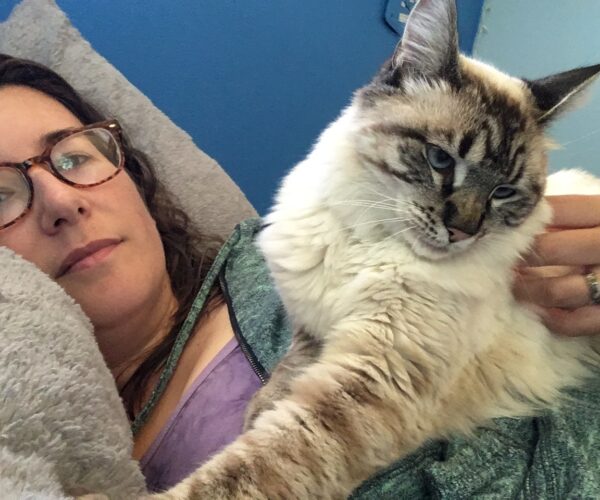Someone recently asked me, ‘What does depression feel like?’ As a poet and essayist, I’m used to describing my experiences with words. But when it comes to depression, I suddenly found myself at a loss for words.
For me, depression is like an open expanse of nothingness. Unlike sadness, which involves emotion and feelings, depression is just emptiness. When I’m depressed, I don’t cry. Instead, I stare at the wall for hours on end. I have no motivation to do anything, not even basic self-care tasks like getting dressed or feeding myself.
What does depression feel like? For me it feels like nothing. It feels like the absence of feeling.
The Intersection of Depression and Chronic Illness
I’ve been living with major depressive disorder for far longer than I’ve been dealing with my chronic health issues, like ankylosing spondylitis and fibromyalgia. So, I know what my depression feels like, and over the years, I’ve developed several ways to manage it. I have tools I can use to hopefully mitigate a depressive episode, and when I miss the warning signs and end up in the middle of a bad episode, I have a variety of tried-and-true methods to help pull me out of the depths of my mind.
However, being diagnosed with chronic health issues has complicated what is already a complex mental health issue. Living with chronic illness and disability involves stress, sadness, and grieving that can contribute to clinical depression. There is also an overlap in symptoms between depression and many chronic health issues, making it even harder to distinguish the root of what is going on and how to treat.
Depression has been present in my life since I was young, but it made a significant resurgence after becoming chronically ill. Multiple research studies have found that stressful life events, like illness, are significant predictors of depressive episodes.
In her essay about stress and depression, Dr. Kate Stroud writes “severe stressful life events are arguably the most important risk factor for episodes of major depressive disorder.” It makes sense, then, that many others with chronic health issues or disability would experience resurgences of depression (or even initial onset) as symptoms worsen, new diagnoses are added, or health impacts daily life, such as jobs or parenting.
To further complicate things, chronic health issues often share symptoms with depression. Fatigue, problems with thinking or concentration, and weight changes are all listed as potential symptoms for ankylosing spondylitis, fibromyalgia, and depression. It can be challenging to navigate overlapping symptoms of chronic health diagnoses and mental health issues.
Is It My Physical Health Issues, or Am I Depressed?
I’ve jokingly texted a friend variations of the above many times: “Is it my AS, or am I just depressed? Am I tired because I overdid it, or am I the scary kind of tired?”
It can be really difficult to untangle the cause of various symptoms, and yet it is important to do so. If I’m fatigued due to a flare-up of my chronic health issues, it’s imperative that I rest to avoid worsening my symptoms. However, if my fatigue is due to depression, I need to find ways to stave off an episode. If my fatigue is a symptom of depressive disorder, going for a walk with a friend might help, whereas if it’s due to post-exertional malaise, I should stay in bed and rest.
Understanding what depression feels like (or, in my case, doesn’t feel like) is vital. If I’m exhausted, can’t get out of bed, and feel down, it’s likely due to one of my chronic health conditions. In that case, it’s not that I don’t want to do things; my body can’t physically do them. However, if I’m apathetic about being stuck in bed or want to cancel plans to stay in bed, I’m probably staring down a depressive episode and the vast expanse of emptiness that comes with it.
Learning to Live with Depression Alongside Chronic Illness
Both physical health and mental health issues can take a lot of life adjustments to learn how to live one’s best life while dealing with symptoms. I’ve found a handful of tips that make this process easier for me.
Find Professional Help
Get a therapist or life coach who can help navigate these things with you. Specifically finding someone who is familiar with chronic health issues can be really helpful, as some of the typical depression ‘hacks’ like “go for a hike” may not be accessible to those of us with disability or chronic physical conditions. A knowledgeable professional will allow you space to process and also help you come up with ways to work with both your physical and mental health symptoms.
Become a Student of Yourself
Track your symptoms, journal about what you’re feeling, keep voice memos about the things you’re experiencing day to day with your conditions. Research yourself and intimately get to know all of the workings of your brain and body. While this may seem tedious at first, being able to differentiate your symptoms (brain fog from fibro versus from depression), or understand why you might be experiencing something (a change in the weather causing a shift in physical symptoms, or a stressful interaction with a friend causing a spike in depression) can be really helpful in learning to manage your conditions.
Give Yourself Grace
Being human is hard. Being a human with chronic illness is hard. Being a human with chronic illness and mental health issues is even harder. There will be days where it feels like too much and that is okay. Just remember you can always wake up tomorrow and approach the world anew. And remember those days that feel like nothingness? They will pass, and you will feel again.
Be a More Proactive Patient with ArthritisPower
Join CreakyJoints’ patient-centered research registry to track your symptoms, disease activity, and medications — and share with your doctor. Sign up.






